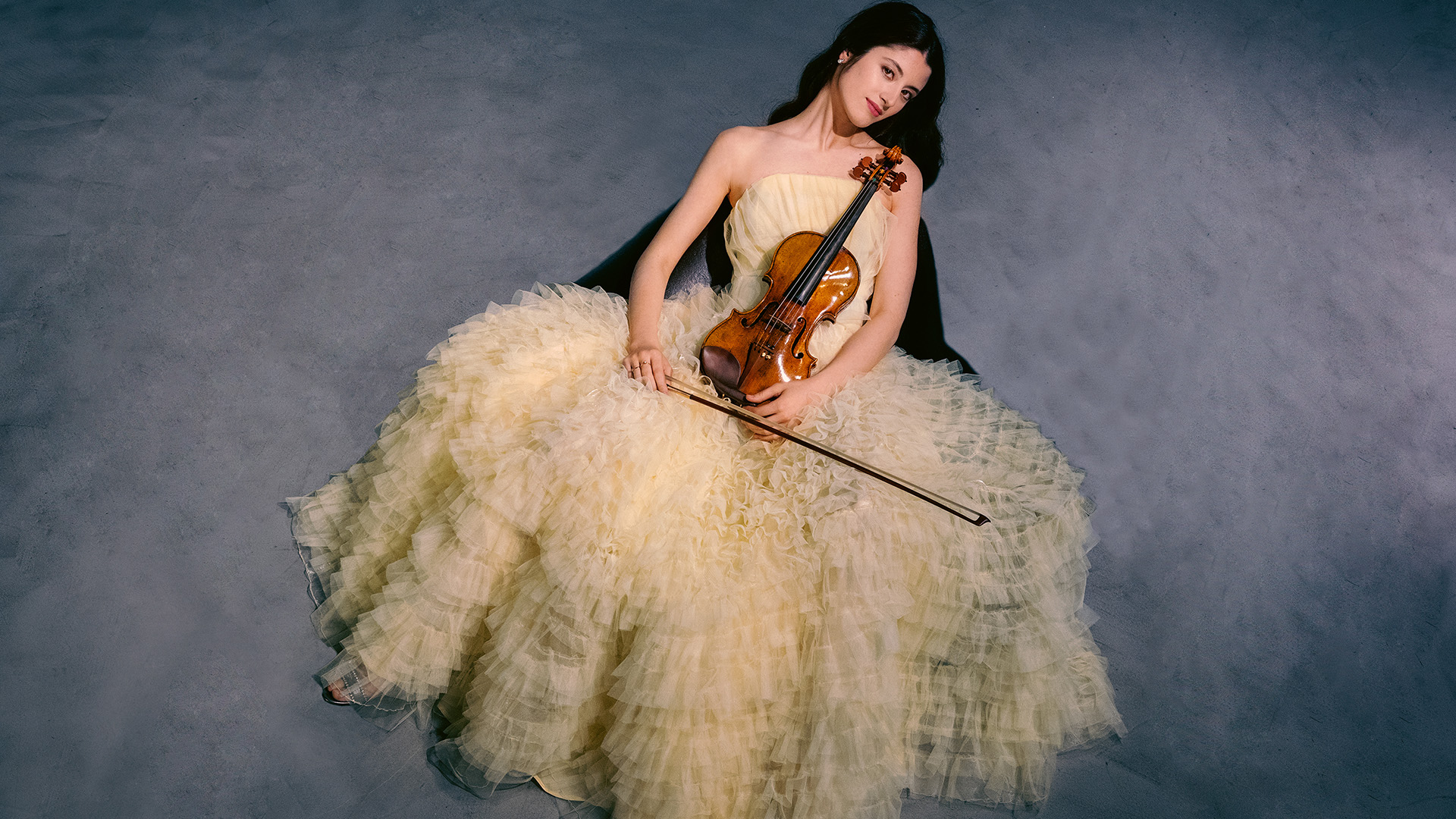Violinist María Dueñas, 22, tours the world's concert halls, buoyed by rave reviews, competition wins and standing ovations.
Violinist María Dueñas tours the world's concert halls, buoyed by rave reviews, competition wins and standing ovations. Conductor Marek Janowski is one of the great masters of the German musical tradition. He even received an honorary award from German record critics in recognition of his achievements as a gracious orchestra educator and uncompromising champion of quality.
Felix Mendelssohn: Violin Concerto in E Minor, Op. 64
The violin concerto composed by Felix Mendelssohn for his violinist friend Ferdinand David, leader of the Leipzig Gewandhaus Orchestra of which Mendelssohn was conductor, got an ecstatic reception at its premiere in 1845 and has remained firmly in the concert repertoire even during the times when the music of Mendelssohn was either politically or aesthetically frowned upon. It is in fact performed so often that the British musicologist Donald Tovey went so far as to say, “I rather envy the enjoyment of anyone who should hear the Mendelssohn concerto for the first time and find that, like Hamlet, it was full of quotations.” Despite being cast in the more or less established mould, the concerto does have some signs of experiment. One is the main theme of the first movement, which is introduced right at the beginning by the soloist and not the orchestra. The concerto is in three movements, the second and third performed without a break.
Franz Schubert: Symphony No. 8 in C Major “The Great” D 944
Franz Schubert (1797–1828) is thought to have heard an unofficial run-through of his C Major symphony of 1826, but never a concert performance. For lasting nearly an hour, it was deemed too long and much too difficult for the players. Ten years later, the score was nevertheless discovered by Robert Schumann, who showed it to Felix Mendelssohn, who conducted its premiere in Leipzig in 1839. This time the reception was most enthusiastic, and Schumann went so far as to praise its “heavenly length”. The symphony is known as “The Great” simply to distinguish it from the “Little C Major” of 1818. By the latter half of the 1820s, Schubert knew he was mortally ill. This may be heard in his music, in which great beauty alternates with deep desolation. This is particularly marked in the slow second movement, though the others are distinctly optimistic. The symphony previously bore the number 9, but the New Schubert Edition favours 8, as Schubert is known to have been working on a further symphony, in D major, just before his death.
María Dueñas
María Dueñas (born 2002) is a Spanish violinist. Winner of numerous international violin competitions, including the 2021 Menuhin Violin Competition, Dueñas has been invited to appear with many prominent European and American orchestras as a soloist and chamber musician. A multi-faceted artist, she is also a composer.
Highlights of the 2024–2025 season include Dueñas’s debuts with the Staatskapelle Dresden and the Philharmonia Orchestra, as well as her return to the Philadelphia Orchestra, the Pittsburgh Symphony Orchestra, and the Staatskapelle Berlin. She also appears with the RAI National Symphony Orchestra and the Helsinki Philharmonic Orchestra under Marek Janowski.
Dueñas enrolled at her native Granada’s Conservatory at the age of seven. In 2014, she moved to Germany to study at the Carl Maria von Weber College of Music in Dresden. In 2016, she continued her education at the Music and Arts University of Vienna (MUK) and the University of Music and Performing Arts in Graz, Austria. For several years, she has studied with Professor Boris Kuschnir.
Marek Janowski
Marek Janowski (born 1939) is one of the great masters of the German musical tradition, recognised worldwide for his interpretations of Brahms, Bruckner, Hindemith, Richard Strauss, Wagner, and the Second Viennese School. Since the 1990s, Janowski has focused on the great German symphonic repertoire, for which he enjoys an outstanding reputation.
Janowski regularly works with such ensembles as the Chicago, San Francisco, National, and NHK symphony orchestras; the Berlin, Dresden, and Oslo philharmonic orchestras; the WDR Symphony Orchestra Cologne, NDR Elbphilharmonie Orchestra, Tonhalle-Orchester Zürich, Orchestre de la Suisse Romande, and Orchestre Philharmonique de Radio France. In the 2024–25 season, Janowski makes his New York Philharmonic debut and appears with the Helsinki Philharmonic Orchestra, among others.
Marek Janowski was Chief Conductor and Artistic Director of the Dresden Philharmonic Orchestra from 2019 to 2023 and from 2001 to 2003. He was born in Warsaw and educated in Germany.
Violin 1
Jan Söderblom
Kreeta-Julia Heikkilä
Eija Hartikainen
Katariina Jämsä
Sanna Kokko
Kati Kuusava
Elina Lehto
Liam Mansfield
Kari Olamaa
Petri Päivärinne
Kalinka Pirinen
Harry Rayner
Serguei Gonzalez Pavlova
Pia Sundroos
Violin 2
Teija Kivinen
Kamran Omarli
Krista Rosenberg
Eva Ballaz
Heini Eklund
Dhyani Gylling
Linda Hedlund
Anna-Maria Huohvanainen
Siiri Rasta
Ángeles Salas Salas
Virpi Taskila
Pauline Fleming-Unelius
Viola
Carmen Moggach
Mariette Reefman
Aida Hadzajlic
Kaarina Ikonen
Tiila Kangas
Liisa Orava
Markus Sallinen
Hanna Semper
Iiris Rannikko
Cello
Lauri Kankkunen
Saara Särkimäki
Jaani Helander
Fransien Paananen
Ilmo Saaristo
Tommi Wesslund
Sami Mäkelä
Antto Tunkkari
Bass
Ville Väätäinen
Oskari Hänninen
Paul Aksman
Miranda Erlich
Venla Lahti
Adrian Rigopulos | Flute
Elina Raijas
Enna Puhakka
Oboe
Hannu Perttilä
Jussi Jaatinen
Clarinet
Niina Selin
Osmo Linkola
Bassoon
Markus Tuukkanen
Vertti Tapanainen
Horn
Joonas Seppelin
Sam Parkkonen
Trumpet
Pasi Pirinen
Tomas Gricius
Trombone
Victor Álvarez Alegria
Valtteri Malmivirta
Jussi Vuorinen
Timpani
Mikael Sandström |

